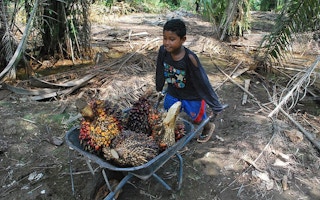Fourteen of the 32 Indonesian billionaires identified by Forbes magazine are palm oil tycoons, having accumulated their wealth at least in part through the industry.
That includes six of the country’s 10 richest, and 12 of its wealthiest 20.
They are Budi and Michael Hartono; Susilo Wonowidjojo; Anthony Salim; Eka Tjipta Widjaja; Chairul Tanjung; Murdaya Poo; Theodore Rachmat; Putera Sampoerna; Peter Sondakh; Sukanto Tanoto; Martua Sitorus; Ciliandra Fangiono; Prajogo Pangestu; and Bachtiar Karim.
Almost all of these men established themselves as members of the Southeast Asian nation’s oligarchy during the 33-year reign of strongman President Suharto, who fell in 1998.
During the palm oil boom of the 2000s, Indonesia surpassed Malaysia to become the world’s top producer of the commodity. So too did the number of Indonesia’s billionaires rise during the decade, from two to 11.
The industry’s expansion has continued into the 2010s, driving economic growth but also crippling the archipelago country’s rainforests, fueling a land-grabbing epidemic and desiccating Indonesia’s vast peat swamp zones in such a way as to fuel the disastrous fires that each year blanket the region in a choking haze.
The nation’s richest haven’t completely monopolised the spoils of palm oil, used in around half the goods one finds on supermarket shelves, from chocolate and cooking oil to soap and makeup.
“
The country represents a particularly extreme example of oligarchic dominance and distortion in part because wealth is unusually concentrated.
Jeffrey Winters, political scientist
The industry is said to employ nearly 4 million people in Indonesia, although a substantial portion of them are day laborers who earn next to nothing.
While the processing of crude palm oil into other chemicals happens in a few giant refineries held by conglomerates like Golden Agri-Resources (owner: Eka Tjipta Widjaja, $5.6bn), Wilmar International (Martua Sitorus, $1.44bn) and Musim Mas (Bachtiar Karim, $1.2bn), there are thousands of mills across the country that turn palm fruit into oil, not all of them corporate-owned.
So too at the plantation level are there a number of smaller players, from local entrepreneurs who bankroll plantations to farmers who cultivate oil palm on their own land, typically selling the fruit to a middleman transporter who can bring it to a mill for processing.
But the billionaires’ wild success perhaps speaks to modern Indonesia’s status as one of history’s most unequal societies. The country “represents a particularly extreme example of oligarchic dominance and distortion” in part because wealth “is unusually concentrated,” political scientist Jeffrey Winters wrote in 2012.
Some of those on Forbes’ list are relative newcomers to the sector. That’s the case with Budi and Michael Hartono ($17.1bn) and Susilo Wonowidjojo ($7.1bn), each of whom made their fortunes in cigarettes before diversifying into palm oil.
Others, though, have long been some of the industry’s biggest players. They include Anthony Salim ($5.7bn), whose father, Liem Soe Liong, was one of Suharto’s closest business associates; Sukanto Tanoto ($1.45bn), whose Asian Agri operates dozens of plantations, mills and refineries; and Ciliandra Fangiono ($1.4bn), whose First Resources is mired in what is arguably Indonesia’s highest-profile conflict between an agribusiness and an indigenous community.
Below is a list of Indonesia’s palm oil billionaires, with the caveat that the figures provided are but an estimate of their wealth, much of which is likely to be held secretly. Widjaja, Salim, Tanoto and Prajogo Pangestu ($1.3bn), for example, were named by the International Consortium of Investigative Journalists in 2013 to have over 140 offshore companies between them, mostly in the British Virgin Islands.
Budi and Michael Hartono (1, $17.1bn) – The brothers’ Djarum Group has expanded into oil palm via PT Hartono Plantations Indonesia, which presides over tens of thousands of hectares in Kalimantan.
Susilo Wonowidjojo (2, $7.1bn) – His Makin Group presides over a total planted area of 140,000 hectares in Sumatra and Kalimantan, as well as 13 mills, according to the company’s website.
Anthony Salim (3, $5.7bn) – The Salim Group conglomerate has a land bank spanning hundreds of thousands of hectares in Sumatra, Kalimantan and Papua. The country’s biggest food company, Indofood, is also part of the Salim Group and is a major palm oil user.
Eka Tjipta Widjaja (4, $5.6bn) – Golden Agri-Resources is an arm of his Sinar Mas conglomerate, which also owns Asia Pulp & Paper, Indonesia’s biggest paper company.
Chairul Tanjung (6, $4.9bn) – CT Agro is the agribusiness arm of CT Corp. Its website says it has 60,000 hectares of plantations in Kalimantan and plans to invest in mills and refineries.
Murdaya Poo (9, $2.1bn) – His Central Cipta Murdaya Group is heavily involved in the agribusiness megaproject planned for Merauke district, Papua province. His wife, Siti Hartati Murdaya, was jailed for bribing the head of Buol district in South Sulawesi province in order to obtain a permit for an oil palm plantation there.
Theodore Rachmat (11 ,$1.92bn) – His Triputra Agro Persada is one of Indonesia’s fastest-growing palm oil companies, with a land bank of around 300,000 hectares.
Putera Sampoerna (12, $1.8bn) – Sampeorna Agro is another major palm oil producer. In August the company was ordered to pay $76 million over fires that burned across one of its concessions in Riau province in 2014.
Peter Sondakh (14, $1.69bn) – His Rajawali conglomerate’s Eagle High Plantations owns plantations in Sumatra, Kalimantan, Sulawesi and Papua, plus seven mills.
Sukanto Tanoto (16, $1.45bn) – His Royal Golden Eagle conglomerate owns Asian Agri, one of the major palm oil refiners.
Martua Sitorus (18, $1.44bn) – His Wilmar International is biggest palm oil processor. It owns a huge network of refineries, mills and plantations in Indonesia.
Ciliandra Fangiono (20, $1.4bn) – His First Resources is one of the largest oil palm planters, especially in Kalimantan.
Prajogo Pangestu (25, $1.3bn) – His Barito Pacific is a diversified conglomerate with oil palm plantations and mills in West Kalimantan.
Bachtiar Karim (27, $1.2bn) – His Musim Mas is another major refiner.
This story was published with permission from Mongabay.com.

















